The Nexus 6 Review
by Brandon Chester on November 12, 2014 1:00 PM ESTCamera
The camera has always been something of a pain point for Nexus devices. Since the Galaxy Nexus launched we've seen camera sensors that always seemed to be one step behind the competition. The price point that Google had aimed for with their Nexus phones certainly contributed to this, and software issues like upscaled, stretched, or cropped previews did not help the situation either. With the Nexus 6 being priced as a premium device, one would hope that it sports an equally premium camera, and indeed it does. The Nexus 6 uses Sony's IMX214 with an F/2.0 aperture and OIS for the rear camera, a sensor we've seen in HTC's Butterfly 2, and the OnePlus One just to name a couple of examples. I'm happy with Google's decision to continue using 4:3 camera sensors which tend to make framing scenes easier than 16:9 sensors in my experience.
Before looking at photos taken with the Nexus 6, it's important to look at how fast it is able to focus and capture photos. After all, if your phone takes too long to focus, the moment you wanted to photograph may already be over by the time you can take the shot.
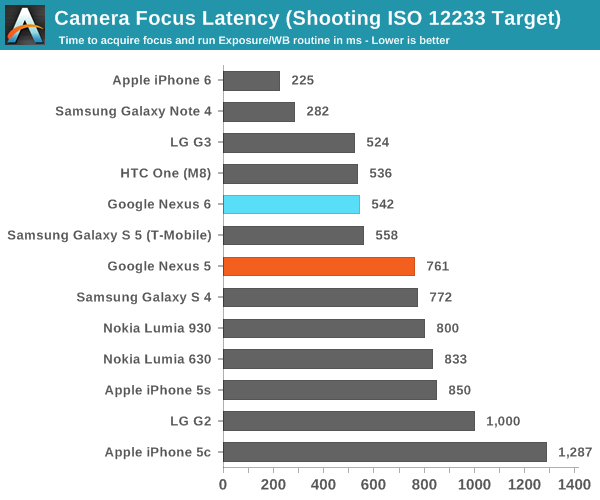
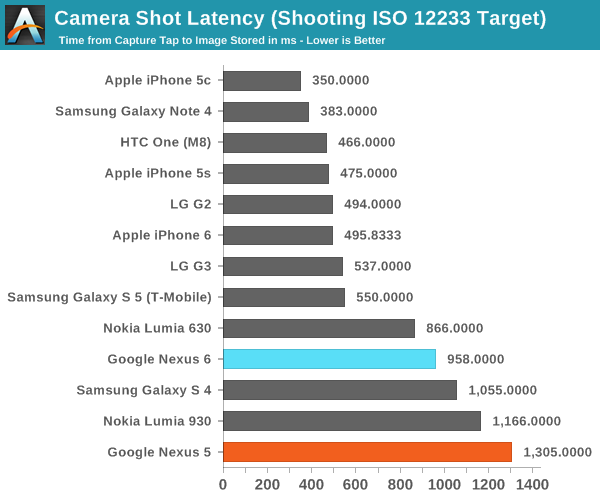
The Nexus 6 has a focus latency which is competitive with some of the flagship devices released this year like the LG G3 and HTC One (M8), but it's not in the same class as the recently released iPhone 6 and Galaxy Note 4. The shot latency is also surprisingly long, and I repeated the test multiple times to confirm. The Nexus 5 also had a long capture time, and so it may be that this is a result of issues in Google's Camera application rather than anything relating to the device's camera itself.
The Nexus 6 seems to vary its ISO between 40 and 1200, while the Nexus 5 typically varied between 100 and 1600 with some extremely high values as high as 3000 in certain circumstances. I was only able to get exposure time up to 1/12th of a second which is somewhat fast for a device with OIS. The Nexus 5 wasn't shy about going up to 1/6th of a second if it needed to.
The camera software is also an important aspect of mobile photography. Google's Camera application is actually quite good for a relatively automatic photo experience. I do think that Google could expose more of the controls like switching between camera modes and toggling the flash as constantly visible controls without reducing the amount of space for the preview significantly. Something I noticed while using the Nexus 6 is that the colors of the preview in the viewfinder were quite saturated. This is, of course, due to the display calibration, which unfortunately means that the viewfinder is not very helpful in determining how the photo is actually going to look. The preview framerate also tends to run below 30fps which has been the case for a long time now, but I hope that pointing it out will eventually get it improved.
Still Image Performance
These next tests use photographs of an outdoor area at various times to guage the performance of a smartphone's camera relative to other smartphones, as well as a controlled test scene inside a well lit area. I am unfortunately limited by the number of devices I have on hand, which at the moment includes the Nexus 6, iPhone 6, Nexus 5, and HTC One (M7).
Before getting into the actual tests I wanted to mention something about smartphone camera white balance that won't be apparent based on the images alone. Based on how I actually saw the scene as I was taking the photos, I can confidently say that the Nexus 6 consistently had a far more accurate white balance than any of the other devices I tested. This can actually have a huge impact on the overall appearance of the image, and it can be easy to overlook when doing these sorts of comparisons. For example, the iPhone 6 photo in the evening test has a shift toward blue that makes it appear to be much darker out than it actually was, while the Nexus 6 more accurately reflects how the scene looked at the time. With that out of the way, lets begin with the daytime test.
In this first test the Nexus 6 performs very well. I would say it produced the best overall image of the four devices I tested. The higher resolution sensor allows for greater sharpness and detail in areas like the branches of the trees, and the bars of the black metal gate on the left side are only captured with sufficient detail by the Nexus 6. However, I did notice an issue with the output from the Nexus 6, which is a concerning amount of blur in the section of branches that is to the right of the centre of the image, but not at the very right edge of the frame. I took several photos and even repeated the test on a different day, but the issue persisted.
In this next test we have the same scene at a later time of day with less natural lighting. The performance of the iPhone 6 approaches the Nexus 6 due to its larger sensor pixels giving it an edge in low light circumstances, but the Nexus 6 still maintains an overall higher level of detail and sharpness, particularly on the trees.
With the outdoor scene in low light we can see that all of our devices start to struggle. The Nexus 6 ends up sharper and less noisy than the Nexus 5 by driving a much lower ISO of 1200 instead of 2500. However, the brick building on the right shows that although the OIS on the Nexus 6 allows for a longer shutter time, Apple's iPhone 6 is able use a lower ISO and better preserves detail with finer grained noise throughout the image in general.
The last test we perform is a highly controlled test scene with generous lighting and different textures to see how well the Nexus 6 is able to capture detail in something of a best case scenario. In this case the Nexus 6 once again provided the best sharpness and detail preservation of all the devices I tested. The white balance is shifted toward pink which is an odd exception from the performance in the other tests.
I'm very happy with the improvements Google has made to their camera on the Nexus 6. I no longer feel like Nexus devices will always be a generation behind the competition when it comes to camera quality. Google and Motorola should also congratulate themselves on their white balance algorithm which helped the Nexus 6 to take photos that better reflected how the scenes actually looked in real life. I hope Google will continue to improve their camera software to make the user interface less menu driven, and to improve capture times for photos which is the one area that the Nexus 6 really falls behind its competition.


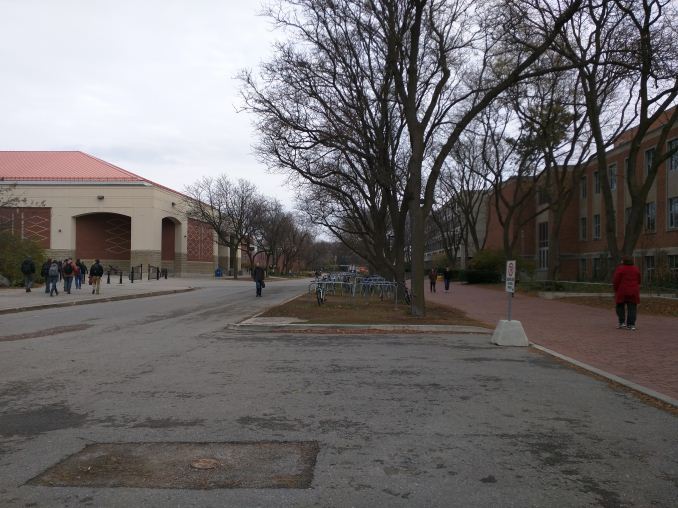




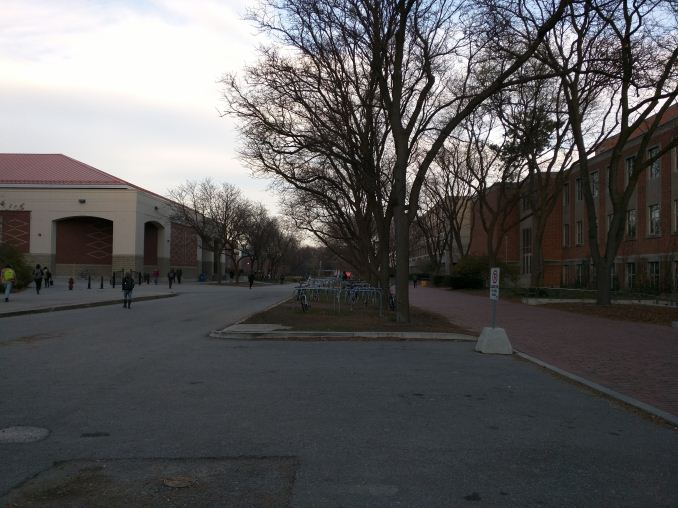




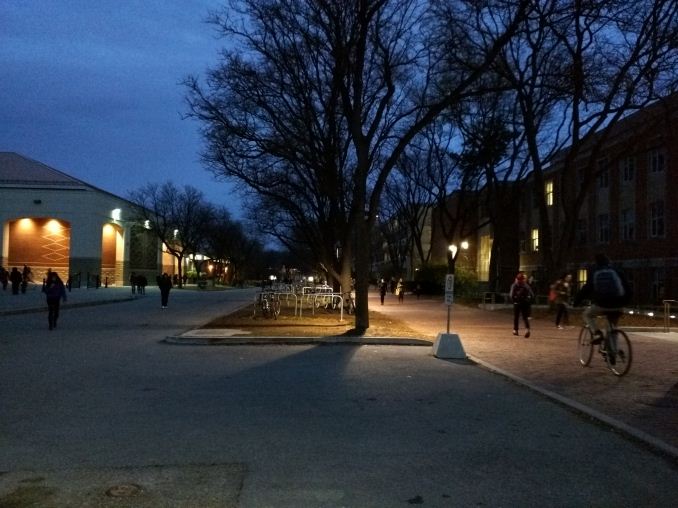




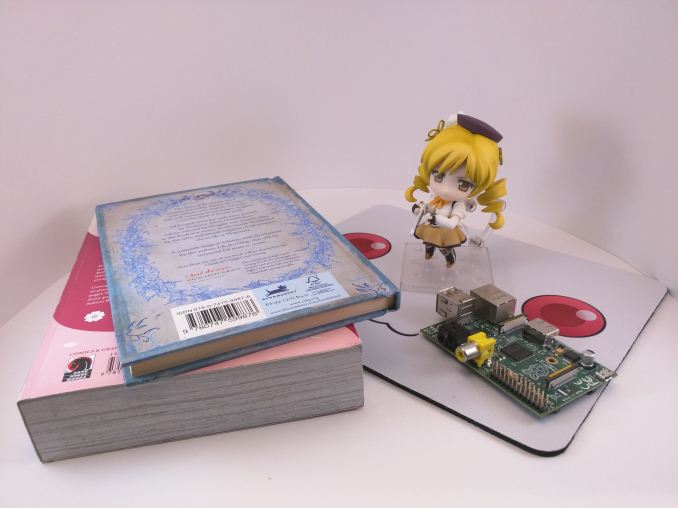












136 Comments
View All Comments
Muyoso - Wednesday, November 12, 2014 - link
Go ahead and tell me again why the $649 pricetag is justified because this is the "no compromises" Nexus we have been waiting for. . . . . . .Affectionate-Bed-980 - Wednesday, November 12, 2014 - link
In come the Nexus apologists that say this is a developer's phone!I say this as someone who's owned 4 Nexus phones and have been disappointed in battery and camera each time.
Muyoso - Wednesday, November 12, 2014 - link
The thing is, with prior Nexus phones, the battery and camera shortcomings could be justified because of the price. At $649, Google has to be high. Aluminum trim ain't that special.dishayu - Wednesday, November 12, 2014 - link
It's a fair price for the device. It's not cheap for US Americans because your retarded mobile carriers. For the rest of the world, where BYOD plans are without contract and dirt cheap, the phone is priced very competitively. It's cheaper than a Galaxy S5, HTC One M8 and LG G3 where I live.Frenetic Pony - Thursday, November 13, 2014 - link
Ouch, really? Just googled a G3, unlocked its $450 here. Ahh international markets, exchange rates and etc. Will you ever make things sensible?dishayu - Thursday, November 13, 2014 - link
The prices of the G3 have indeed dropped considerably but the nexus 6 is still priced at par with competition. Just checked Clove.co.uk and here are the prices :HTC One M8 : 499 GBP
Note 4 : 575 GBP
Xperia Z3 : 515 GBP
Nexus 6 32GB : 499 GBP (play store)
ws3 - Thursday, November 13, 2014 - link
That's all beside the point. Previous Nexus phones were priced considerably below the off-contract price of other phones with similar specs. This one isn't. That is the only claim being made.Acreo Aeneas - Sunday, November 23, 2014 - link
Maybe you should reread the article. Other than a few previous Nexus phones, the rest were about on pay pricing wise with the mainstream competition.Delfang - Thursday, November 13, 2014 - link
The fact that Z3 is available for 450 GBP on Amazon make your point invalid.garretelder - Thursday, December 4, 2014 - link
I'm personally not very impressed with the Nexus 6 (and neither is rankings like http://www.topreport.org/phones/ for example).